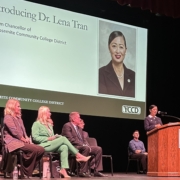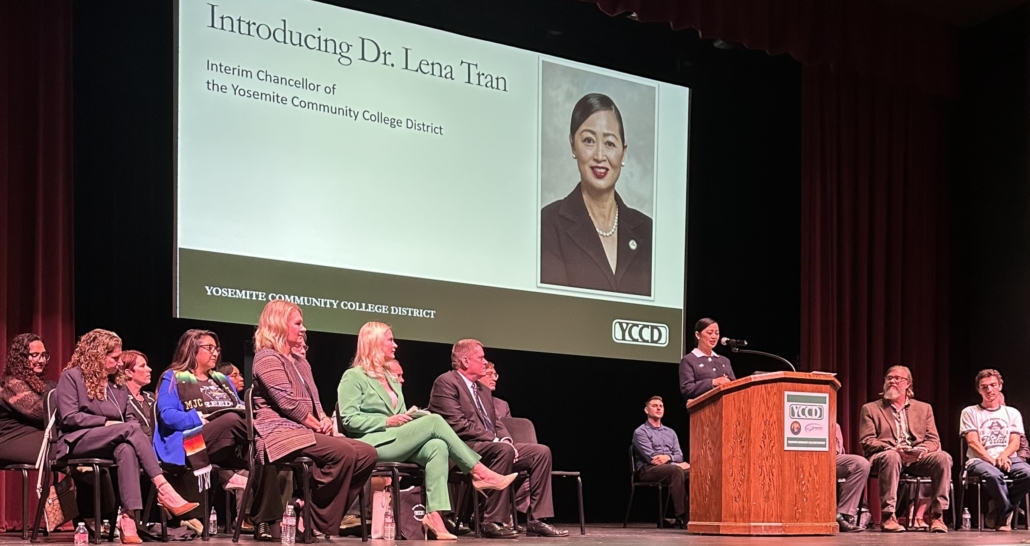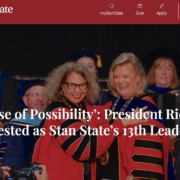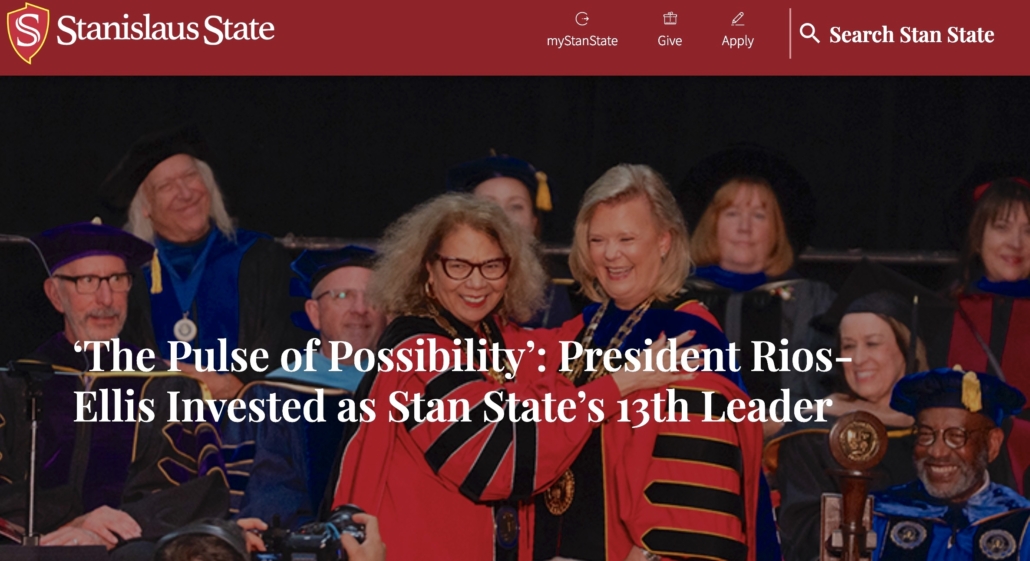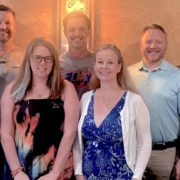CVHEC’s “secret sauce” — PRIDE
Board champions identified to ensure follow-through and accountability
BY TOM URIBES
CVHEC Communications/Media Lead
Following up its recent one-day Strategic Planning Retreat, the Central Valley Higher Education Consortium (CVHEC) Board of Directors announced the development of four key areas of focus for the next three to five years and the formation of advisory boards to champion progress in each area.
The four advisory boards are: Data Sharing and Regional Dashboards; Workforce Aligned Program Development; Artificial Intelligence (AI); and Enrollment, Reconnect.
The advisory boards were created during the CVHEC Board retreat Aug. 20 when the leaders from colleges and universities across California’s Central Valley gathered at the University of California, Merced to chart a bold course for the next three to five years.
The boards consist of chancellors, presidents and campus directors of the Central Valley’s 28 institutions of higher education who make up the CVHEC Board of Directors.
In welcome remarks to the leaders at the retreat, CVHEC board chair Dr. Juan Sánchez Muñoz, chancellor of University of California Merced, said, “We need to work together to support our students. We’re here to create a vision for how we celebrate.”
Facilitated by Nitya Wakhlu and Greg Netzer of Drawbridge Innovations, the retreat emphasized interaction and problem-solving. Prior to the retreat, board members participated in a survey identifying regional challenges most pressing to their institutions.
During the session, participants divided into small groups to tackle those challenges. Using structured templates, they explored questions such as:
- What is the core challenge we need to solve?
- Who is impacted, and what are we hearing from stakeholders?
- What role should CVHEC play, and how can institutions collaborate?
- What barriers exist, and what resources are needed?
Each group developed a “challenge charter” and presented their ideas to the full board.
Using a dot-voting process, members prioritized three to five strategic initiatives for CVHEC to pursue over the next three to five years. Champions were identified for each initiative to ensure follow-through and accountability.
The group arrived at CVHEC’s “secret sauce” — PRIDE:
PARTNERSHIPS – unique CVHEC structure and membership collaboration
RESPONSIVE LEADERSHIP – we make decisions, having the CEO’s in the room with equal voice working on challenges that matter
IDENTITY – THE CVHEC WAY – doing things with a unique approach, being a national role model
DEMOGRAPHICS AND RESEARCH – serving the most underserved communities of our region
EXTERNAL INVESTMENT – our unique structure, focus, and work make us attractive for external investment
“This was the consortium at its best,” said Dr. Benjamín Durán, CVHEC executive director. “We saw CEOs from across the Valley not only identify shared challenges but also commit to being part of the solution. That’s the spirit of CVHEC.”
The advisory boards and their current members (membership in progress):
WORKSTREAM 1: Data Sharing and Regional Dashboards
Dr. Lena Tran, chancellor – YCCD (sp)
Dr. Britt Rios-Ellis, president – Stanislaus State
Dr. Carole Goldsmith, chancellor – SCCCD (sp)
Dr. Sean Hancock, president – COS
WORKSTREAM 2: Workforce Aligned Program Development
Dr. Jerry Buckley, president – Reedley College
Eddie Cunha, campus director – National University
Dr. Chad Redwing, president – Columbia College
Dr. Carla Tweed, president – Coalinga College
Primavera Monarrez, interim president – Porterville College
Dr. Vernon Harper, president – CSUB
WORKSTREAM 3: Artificial Intelligence (AI)
James Preston, president – Lemoore College
Dr. Saúl Jiménez-Sandoval, president – Fresno State
Dr. Angel Reyna, president – Madera College
Dr. Jose M. Barral Sanchez, dean – UCSF-Fresno Center
Dr. Lisa Aguilera Lawrenson, president – College
WORKSTREAM 4: Enrollment, Reconnect
Dr. Kim Armstrong, president – Clovis Community College
Dr. Stacy Pfluger, president – Bakersfield College
Dr. Leslie Minor, president – Taft College
Dr. Eddie Cunha, campus director – National University
Insights
After the retreat, board members shared the following reflections:
“Thank you Ben, Angel, and the CVHEC team for bringing us all onto the same page, and reminding us of what CVHEC can do,” said Chancellor Juan Sánchez Muñoz, UC Merced .
“It’s always powerful when you see CEO’s ‘finding common vision and strength’,” said Kristin Clark, CVHEC (West Hills Community College District chancellor-emeritus and former CVHEC board chair).
“CVHEC is an opportunity to come together, share and be restored in community,” Merced College President Chris Vitelli said.
“I am excited about the AI conference and the applications it can have in the classroom,” said President Angel Reyna of Madera Community College.
The Central Valley is definitely “valley strong,” but we also are “valley kind … people are generous and free to give,” said Stanislaus State President Britt Rios-Ellis.
“There’s nothing as dope as this work here,” said Fresno City College President Denise Whisenhunt.
“Excited to keep this work going,” said Fresno State President Saúl Jiménez-Sandoval.
Central Valley colleges gear up for fall
CVHEC Task Forces continue collaborative work to support equitable student outcomes
BY DR. JOHN SPEVAK
CVHEC Project Lead – Merced College Vice President-emeritus
As the fall 2025 semester unfolds, the Central Valley Higher Education Consortium (CVHEC) is once again turning its attention to two of the most persistent hurdles in student success: mathematics and English through two task forces established in the past seven years.
Beginning later this month, CVHEC’s Math Task Force and English Task Force — both consisting of at least one English and one math professor from each of the 15 CVHEC member community colleges in the 28-member consortium — will re-convene educators from across the Central Valley’s 10-county region in a new round of virtual meetings this fall, bringing renewed energy to collaborative solutions that help students succeed in gateway courses.
The Math Task Force, which started as 15 members and has expanded to more than 75 participants, will meet in a series of three Zoom convenings related to implementation of AB 1705 and the 15-member English Task Force is planning one meeting devoted to artificial intelligence.
The task forces, by sharing concerns and best practices, have helped Central Valley community colleges make a significant transition in pedagogy, shifting from a focus on student weaknesses to one on student strengths. The upcoming gatherings will continue a tradition of faculty-led innovation that has become a hallmark of the consortium’s work in recent years.
For the English Task Force, one Zoom meeting, “The Challenges and Opportunities of AI for English Professors in the Central Valley,” is scheduled for Wednesday, Oct. 29, from 3 to 4:30 p.m.
At the three Math Task Force sessions, Central Valley math professors will share their progress following two-plus years of discussing implementation of the state law in hybrid convenings that were entitled “The Central Valley Way for AB 1705” which included college research and data experts, deans and academic leaders from higher ed as well as from K-16 school districts with support from the Charles A. Dana Center at the University of Texas at Austin. The 2025-26 academic year is the first year AB 1705 must be implemented.
Each MTF virtual session is from 10 a.m. to noon:
- Friday, Oct. 24 – “Calculus with a Corequisite” led by Professor Jeremy Brandl of Fresno City College
- Friday, Nov. 7 – “Innovative One-Course Prerequisite” led by Professor Shelley Getty of Taft College;
- Friday, Nov. 21 – “Data Collection and Analysis” led by Professor Nathan Cahoon of Taft College.
Professor Cahoon broke his group’s focus down further noting that a central tenet of AB 1705 and 705 has been to expand student choice.
“As we enter the validation phase for the one- and two-semester calculus precursors, it is essential to review the standards established by the Chancellor’s office,” Prof. Cahoon said.
He explains that the pass rate for students in the precursor classes and in the lowest tier must meet or exceed 50 percent, whereas the pass rate for direct placement, lowest-tier calculus students is 15 percent.
“The goal of this group is to ensure that the data collected and analyzed by the state is accurate,” he said. “There is still concern over previous research conducted by the RP group, and we look to validate the data they collected. A central tenet of AB 1705 and 705 has been to expand student choice. We hope to maintain student choice by preserving the option to take precursors to calculus as they choose.”
CVHEC formed the two groups soon after the passage of California Assembly Bill 705 in 2017 which mandated the elimination of remedial English courses and allowed students to go directly into transferable English courses.
That legislation also increased the options of transferable math courses students could take; mandated the elimination of remedial math courses for entrance into statistics and similar courses; and allowed students to go directly into transferable statistics and similar courses.
And it encouraged increased support for students, including corequisite courses.
The more recent passage of AB 1705, an amplification of AB 705, affected math more than English by expanding AB 705 to include STEM math courses. The Math Task Force continues to work, through sharing and collaboration, toward finding ways to allow the largest numbers of students to go into transferable calculus courses and, when necessary, pre-calculus courses.
AB 1705 went into effect this fall 2025 semester and gives community colleges two years to implement new math courses, including Calculus I with a corequisite and, for each college, one innovative pre-calculus course. At the end of those two years, the California Community College Chancellor’s office will determine if each college has submitted sufficient data to verify the effectiveness of the new courses.
Meanwhile, the English Task Force continues to work, also through sharing and collaboration, toward continuous improvement in teaching and learning in English courses. In ETF meetings during the last two years, much time was spent talking about artificial intelligence.
Discussions like this about AI have been happening across all disciplines, but they are especially important for English professors, since they work at having students not only read and think critically on their own but also write in their own personal voice.
The CVHEC Math and English Task Forces represent one of the consortium’s most impactful strategies: creating faculty-led communities of practice that span institutions and sectors; serving as a collaborative space for faculty to discuss curriculum alignment, address equity gaps and share best practices.
For CVHEC Executive Director Dr. Benjamín Durán, the task forces underscore the consortium’s methodology of collective problem-solving across the Valley – a region-wide commitment to what the consortium calls “The Central Valley Way” towards achieving its mission of enhancing a college-going culture in the region.
“When faculty come together across campuses, they create solutions that no single institution could achieve alone,” Dr. Durán said. “That’s what makes these task forces so powerful for our region and, most importantly, for our students across the Central Valley. For them, the results of this work may mean not only passing a math or English class but truly unlocking the path to transfer, degree attainment and career success.”
Dr. Durán adds that CVHEC has been pleased to convene the task forces and to help facilitate meetings “because the consortium believes in the talent of Central Valley Math and English Task Force professors and their ability to respond to challenges and opportunities effectively as they create a positive ‘Central Valley Way to Student Success’ for their math and English students.”
Also see:
Wrap up: CVHEC Math Task Force Convening Mar. 28
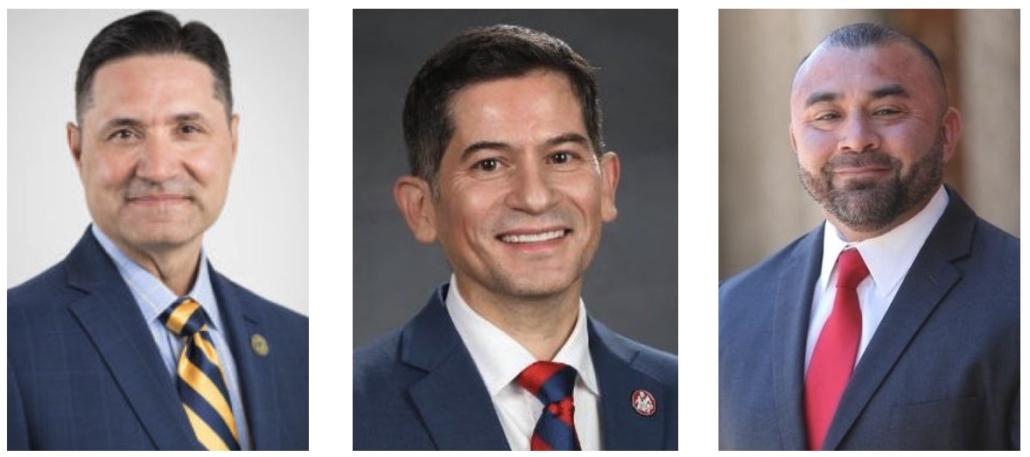
Reelected to the CVHEC Board of Directors Executive Committee for one-year terms that began Oct. 1: University of California Merced Chancellor Juan Sánchez Muñoz, Fresno State President Saúl Jiménez-Sandoval and West Hills Community College District Chancellor Robert Pimentel.
Chancellors Muñoz, Pimentel and President Jiménez-Sandoval get new three-year terms
Three Central Valley higher ed leaders were re-elected to new three-year terms on the executive committee of the Central Valley Higher Education Consortium Board of Directors effective Oct. 1, announced Dr. Benjamín Durán, CVHEC executive director.
Dr. Juan Sánchez Muñoz, chancellor of University of California Merced, who is currently serving a one-year term as chairperson for the board that began in January, was re-elected to the executive committee along with Fresno State President Saúl Jiménez-Sandoval and West Hills Community College District Chancellor Robert Pimentel. The previous three-year terms for all three expired Sept. 30.
The CVHEC Board of Directors consists of the chief executive officers of 28 institutions of higher education in the valley’s 10-county region that comprise the consortium membership. The executive committee conducts business on behalf of the board when it is not available, especially for timely or urgent matters, and sets the agenda for board business, Durán said.
Per CVHEC bylaws, each higher education segment has a set number of representatives on the committee who are elected by the full board of directors. Seven executive committee members serve three-year terms beginning in October the first year.
“The executive committee acts as a smaller, more agile governing body, often handling operational issues and strategic planning between full board meetings, and serving as a sounding board for CVHEC internal leadership,” Durán explained.
The full board meets quarterly with the next session being planned for an early December target date, said Ángel Ramírez, CVHEC associate director.
Executive meetings are also held four times a year prior to board meetings with the first meeting of the 2025-26 executive committee planned for early November at UC Merced where the committee will vote to fill the secretary, treasurer and chair position from among its membership, Ramírez said.
At the recent CVHEC board retreat in August, Chancellor Sánchez Muñoz welcomed the valey higher ed leaders and said about CVHEC’s next steps, “We need to work together to support our students. We’re here to create a vision for how we celebrate.” [
President Jiménez-Sandoval said, “Being reelected for three more years to the executive board of CVHEC is a tremendous honor, as it allows us to continue our noble work in our Valley. This continuity of leadership will allow us to be intentional about our resolve to harness the power of AI, build a strong pipeline between community colleges and four-year institutions, and promote the power of higher education.”
The membership of the 2025 CVHEC Executive Committee by segment with their terms noted is:
• CALIFORNIA STATE UNIVERSITIES (2)
President Saúl Jiménez-Sandoval, Fresno State (2025 –2028)
President Britt Rios-Ellis, CSU Stanislaus (2024 –2027)
• CALIFORNIA COMMUNITY COLLEGES (3)
NORTH – President Chris Vitelli, Merced College (2024 –2027)
CENTRAL – Chancellor Robert Pimentel, West Hills Community College District (2025 –2028)
SOUTH – President Brent Calvin, College of the Sequoias (2024 –2027)
• UNIVERSITY OF CALIFORNIA (1)
Chancellor Juan Sánchez Muñoz, UC Merced ( 2025 –2028)
• PRIVATE/INDEPENDENT (1)
President Andre Stephens, Fresno Pacific (2024 –2027)
First YCCD State of the District address
Interim Chancellor Tran praises community partnerships, innovation at MJC event
BY VIVIENNE AGUILAR
CV Journalism Collaborative
In a year when many California colleges faced the possibility of deep budget cuts, Yosemite Community College District leadership offered a brighter vision in the first-ever State of the District address Wednesday.

Dr. Benjamín Durán, CVHEC executive director, with Dr. Lena Tran, interim chancellor of YCCD, at her first state-of-the-district address Sept. 24 held at Modesto Jr. College.
Interim Chancellor Lena Tran spoke to about 200 assembled fellow administrators, staff, faculty, students and community members on the Modesto Junior College east campus in a speech showcasing the slogan “Deep Roots, Bold Futures.”
In her opening remarks, Tran recounted the barriers she faced to obtain higher education as an immigrant who was brought to America from Vietnam at 8-years-old, and connected her experience to those she hears from students of YCCD colleges.
She acknowledged the sacrifice and struggle community college students in the region face as they work to improve themselves and ultimately, their families and communities.
“That is why I stand here, not only as your interim chancellor, but as someone who deeply understands what it means to fight for that promise. That is why this year’s theme is deep roots and bold futures,” she said.
Since taking on the role of interim chancellor for the district in May, Tran said she and the board of trustees drew on her recent experience as president of Columbia College to create the program. In that role, she held State of the College events at the beginning of each semester, so it was natural for her to continue the tradition.
YCCD oversees MJC and Columbia College in Sonora.
Student enrollment across the district went down slightly in the 2023-24 academic year at 28,500. The year before, YCCD reported 30,000 students between the two colleges.
While the district only operates two schools, its coverage area reaches all of Stanislaus and Tuolumne counties, and parts of Alpine, Calaveras, San Joaquin, Merced and Santa Clara counties.
The district’s 2024-25 budget is more than $170 million, over $20 million more than the previous academic year.
In the last academic year, YCCD helped 2,400 students obtain associate degrees and 83% of career program graduates found employment after graduation. More than half of all YCCD students identify as female, and just over half identify as Hispanic. The district reported 32% of all students are enrolled full-time.
While the California State University and University of California systems initially both faced the prospect of big cuts from the state budget, funding for the state’s 116 community colleges has largely remained intact. The state legislature eventually backed off the deepest cuts.
Darin Sousa, a classified employee at MJC, said he didn’t know what to expect from an event like this, since there has never been one before, and was simply excited to learn what the district’s leadership had to say.
“I’ve worked part time with the athletics department (at MJC) for over 20 years. Now I’m a full time employee, but this is the first time I’ve seen (the district) host an event like this,” he said.
Gov. Gavin Newsom sent congratulations to YCCD for their inaugural program.
“The Central Valley, as you know, is the backbone of our economy and the targeted investments in agriculture, manufacturing and the trades we’re giving more Californians the skills to support their families and strengthen their communities,” he wrote in a message, read by Jesse Ryan, president of the Campaign for College Opportunity.
Health care and agriculture are two of the most notable and necessary workforces in the region, according to Tran. In an effort to innovate and strengthen these sectors, YCCD is connecting its students with local and global experts in these fields.
The district offers students in the health care field dual-enrollment within rural high schools, like the ones in Calaveras and Sonora.
In Modesto, students studying animal husbandry, a sector of agriculture, are being connected with experts in Europe.
This summer, the district combined over $15,000 in scholarship funds from dairies around the Modesto-area to send MJC’s dairy judging to represent the state and country in The Royal Highland Show, a global competition held in Scotland.
Matthew Gutierrez, 19, serves as YCCD student trustee and is studying plant science and education at MJC. He told The Modesto Focus that he’s a product of the district’s strategic planning, especially when it comes to their plans to integrate tools like artificial intelligence and virtual reality into classrooms.
In his agricultural courses, Gutierrez is learning firsthand how artificial technology can be used to improve genetic engineering in plant science.
“It’s not really a future thing. I think it’s already happening,” he said.
Later this year, Gutierrez will intern at Generation Growers Inc., a Modesto-based and family-owned nursery as he plans his transfer to a university.
Tran praised student leaders like Gutierrez for energizing her team and showing them why their work matters.
“Our job is to give them that gift of hope, the tools to achieve their goals, while also reminding them the importance of being humble,” she said.
For more information on career pathway opportunities at Modesto Junior College, visit the school’s “Accelerated Careers Training (ACT)” webpage.
— Vivienne Aguilar is a reporter for The Modesto Focus, a project of the Central Valley Journalism Collaborative. Contact Aguilar at vivienne@cvlocaljournalism.org.
‘Leading with Cariño, Rising with the Pulse of Possibility!’
Stanislaus State marked a historic moment with the investiture of Dr. Britt Rios-Ellis as its 13th president during a ceremony Oct. 3, at Ed and Bertha Fitzpatrick Arena with several fellow Central Valley Higher Education Consortium Board of Directors members and team attending.
The event blended academic tradition with the spirit of the Central Valley, welcoming campus and community members to celebrate Stan State’s mission and future.
President Rios-Ellis began her tenure on July 1, 2024. The investiture, a longstanding academic tradition, formally celebrates her leadership and the university’s shared vision for the future.
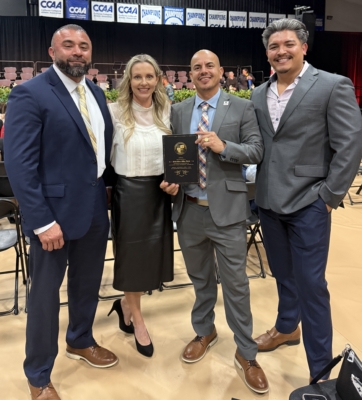
CVHEC board members at the Stanislaus State investiture were Chancellor Robert Pimentel, President Carla Tweed, President Angel Reyna and CVHEC Associate Director Angel Ramirez.
From the moment guests arrived, the program reflected the University’s student-centered identity. CVHEC board members who attended were: West Hills Community College District Chancellor Robert Pimentel, Coalinga College President Carla Tweed and Madera College President Angel Reyna.
Team members attending were CVHEC Associate Director Ángel Ramírez and Administrative Specialist Priscilla Arrellano.
Outside the arena, Ballico Taiko, a student drumming group from the Ballico-Cressey School District, set the tone with a powerful drum performance. Student-athletes lined the processional route, creating a corridor of Warrior pride as the platform party entered Fitzpatrick Arena in academic regalia.
Provost and Vice President for Academic Affairs Rich Ogle served as the emcee for the celebration. Jack Clarke Jr., chair of the California State University Board of Trustees, offered greetings on behalf of the board, welcoming Rios-Ellis and acknowledging the significance of the occasion. Additional greetings were offered by the speaker of the Academic Senate, chair and secretary of Staff Council, president of Associated Students, Inc. and chair of the Alumni Advisory Council.
Musical performances throughout the program reflected the cultural richness of the region and the personal story of the president. The Stanislaus State Latin Jazz Ensemble took the stage early in the ceremony, led by Rios-Ellis’s husband, music educator and musician Enrique Rios-Ellis, on flute. The ensemble performed one of the president’s favorite songs, “La Bikina.”
One of the most heartfelt moments came when Rios-Ellis’s three children — Xóchitl, Enrique Jr. and Itzél — took the stage to share their reflections. As her daughter Xóchitl Rios-Ellis grew emotional, President Rios-Ellis wiped away tears of joy.
“What gives me hope is to see people like you in leadership — people who choose to lead with kindness, respect, integrity and empathy,” Xóchitl Rios-Ellis said. “To have watched you climb from professor all the way to the president of a university is incredibly inspiring, but above all it is well deserved.”
The Mariachi Juvenil Corazón Ranchero from Los Banos Unified School District, featuring students in grades K-12, followed with three songs, delighting the audience and filling the arena with the sounds of celebration.
The ceremony then turned to reflections from distinguished guests. Ron Carter, president and chief executive officer of Carter & Associates and a nationally respected leader in higher education, recognized as an A-C-E Sage and a longtime mentor to Rios-Ellis, offered heartfelt remarks recalling her leadership journey and the qualities that have defined her career.
The Chancellor of the California State University Mildred García followed with remarks praising Rios-Ellis’ vision and the compassion that drives her leadership.
“She calls it a spirit of cariño — a deep caring and commitment to the students, faculty, staff, alumni and community members who comprise the extended Stan State family,” García said.
“Britt, there is no doubt in my mind that under your leadership this institution will reach even greater heights as a shining model of inclusive excellence, a powerful engine for social mobility and as a vital and essential community, economic, social and cultural hub for the Central Valley.”
As the final speaker, Rios-Ellis took the podium to close the ceremony with a message of shared purpose and gratitude.
“Please know that I am both deeply blessed and inspired by the trust you place in me to lead this extraordinary University,” she said. “Our gathering today symbolizes a unified commitment to nurturing a vibrant community dedicated to progress. This investiture is about us.”
In her address, titled “The Pulse of Possibility and Leading with Cariño,” Rios-Ellis reflected on the University’s role as more than an academic institution.
“We have always aspired to be much more than an academic institution,” she said. “We are a beacon where dreams flourish and opportunities abound. Together, we are creating an environment wherein knowledge, diversity, respect and collaboration thrive, ultimately shaping a brighter future for the Valle Central.”
“Together we are building something powerful: A University nationally recognized for its quality, value and impact. A University that not only reflects the Valle Central but shapes its future. There is one undeniable fact: When Stan State thrives, the Central Valley thrives,” said President Rios-Ellis
Throughout her remarks, Rios-Ellis returned to recurring themes of belonging, equity and shared purpose, ideas that have defined her first year as president. She emphasized the transformative power of education and the importance of equity-driven practices as catalysts for progress.
“My vision for Stan State is one where everyone, of all backgrounds, has equitable access to the resources and opportunities they need to thrive,” she said. “Cariño-laden inclusivity is the force that transforms education into equity, and equity into progress. At Stan State, cariño is demonstrated in the way we show up for one another, the way we center students in every decision and the way we embody strength and kindness as Warriors.”
She described the “pulse of possibility” she felt the moment she arrived on campus — a rhythm of resilience, dreams and aspirations carried by students, faculty, staff, alumni and partners throughout the Valley.
“It is the rhythm of hard work through challenges overcome and destinations realized,” she said. “This pulse is alive in every lecture hall, every lab, every relationship and every graduate who walks across our stage. It is truly the sound of bright futures unfolding.”
The Investiture served as the centerpiece of a series of events celebrating Rios-Ellis’s presidency. Additional festivities are scheduled for later this month.
Friday’s ceremony reflected the themes that have guided her first year: belonging, collaboration and a shared commitment to the Valley’s future.
“This moment,” Rios-Ellis said, “is our chance to reaffirm our dedication to excellence, belonging and the transformative power of education, ensuring that Stan State is a place where dreams are realized and families and communities are strengthened.
“Together we are building something powerful: A University nationally recognized for its quality, value and impact. A University that not only reflects the Valle Central but shapes its future. There is one undeniable fact: When Stan State thrives, the Central Valley thrives.”
See original Stan State story:

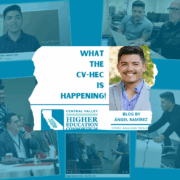

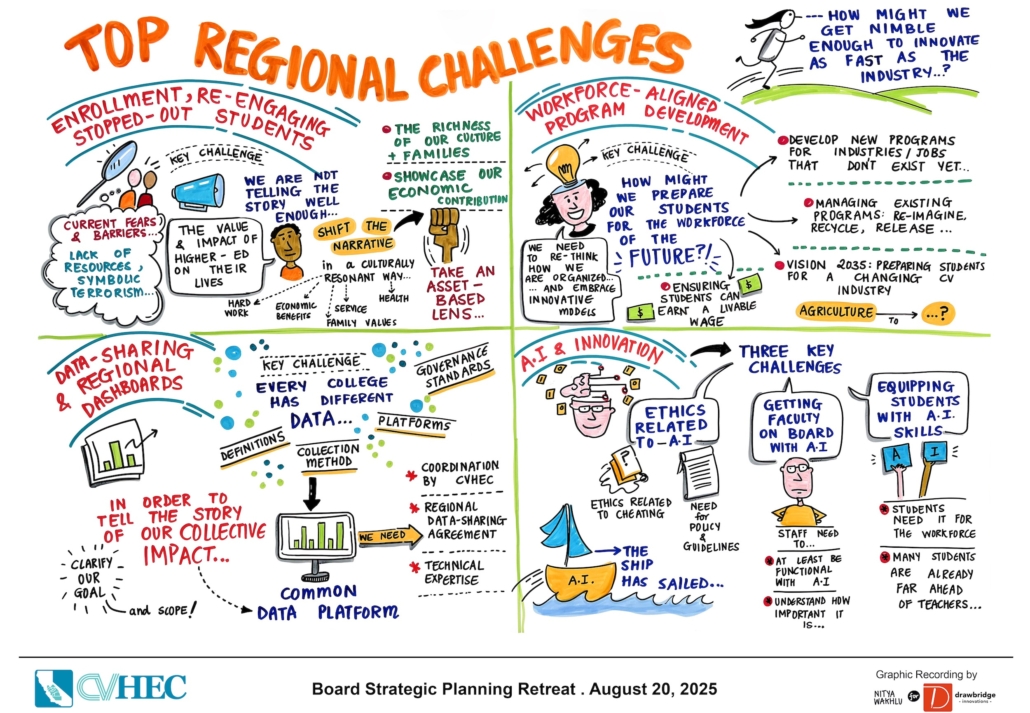
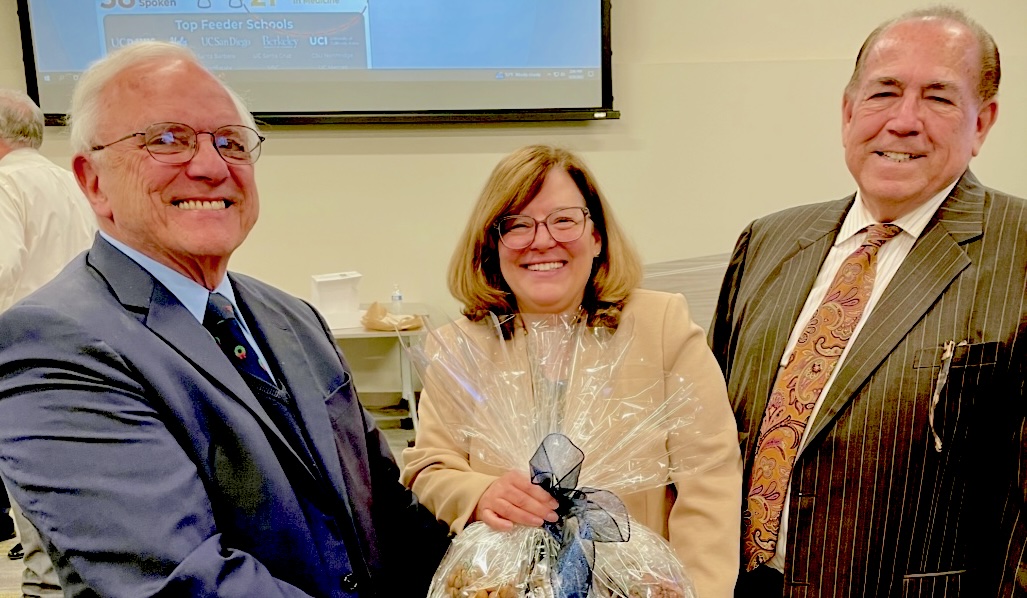
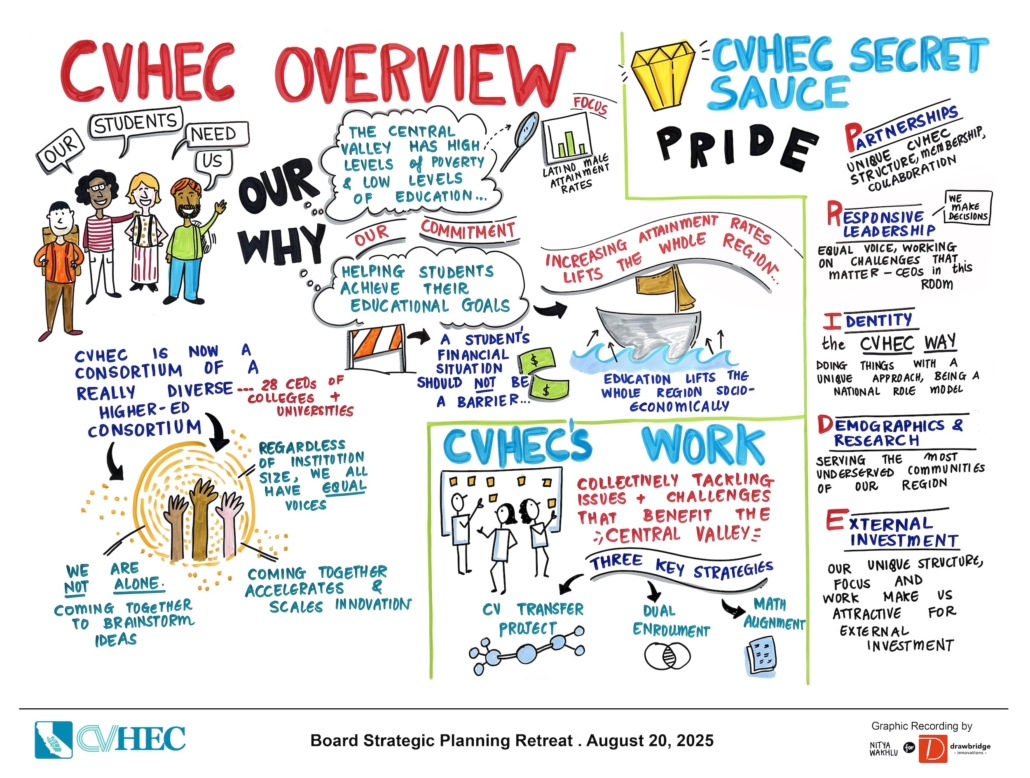

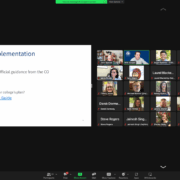



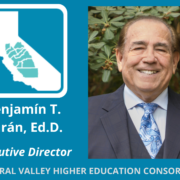
 Composed of the CEOs of our 28-member institutions of higher education, the board was hosted by CVHEC Board Chair and UC Merced Chancellor Dr. Juan Sánchez Muñoz for the retreat where 23 of our 28 board members attended and participated in the day-long facilitated session held Aug. 20 at the beautiful UC Merced campus.
Composed of the CEOs of our 28-member institutions of higher education, the board was hosted by CVHEC Board Chair and UC Merced Chancellor Dr. Juan Sánchez Muñoz for the retreat where 23 of our 28 board members attended and participated in the day-long facilitated session held Aug. 20 at the beautiful UC Merced campus.